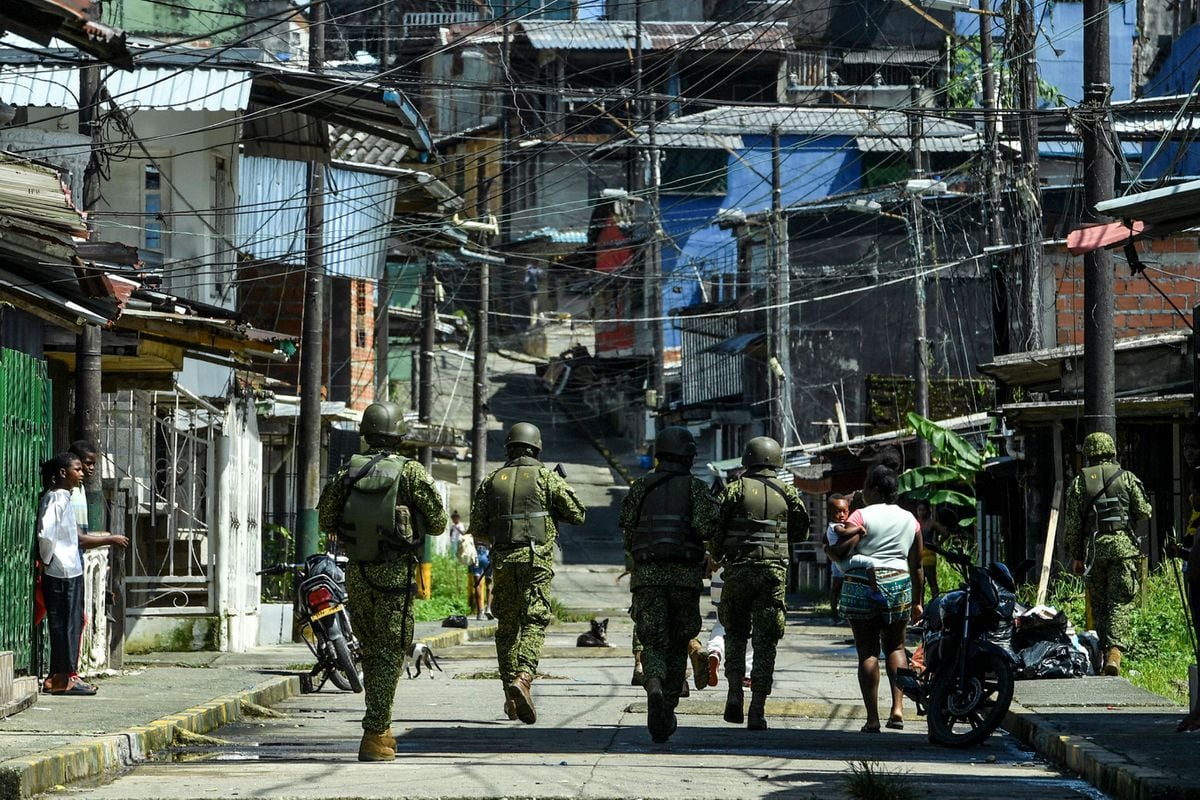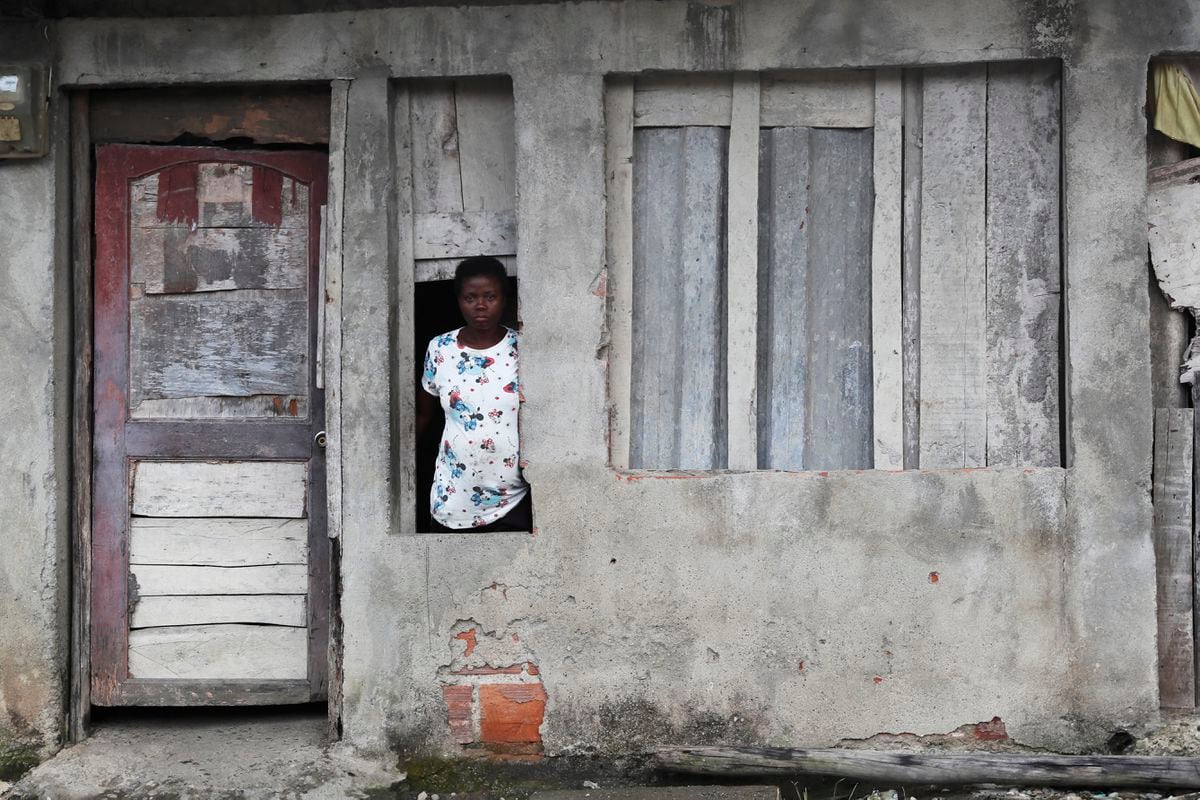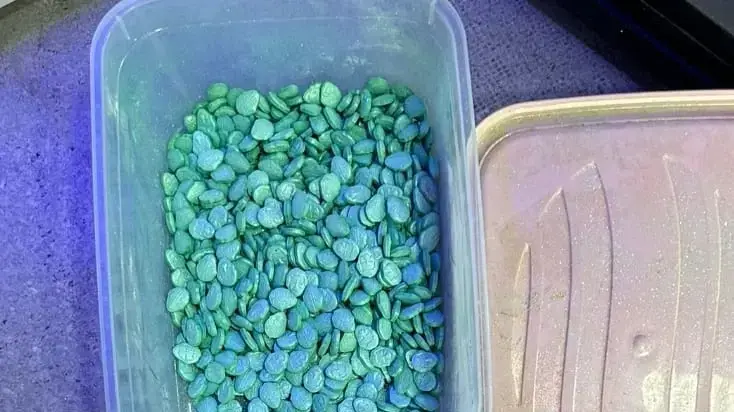Members of the Colombian National Army patrol a street in Buenaventura. JOAQUIN SARMIENTO (AFP)
Dangers lurk in the streets of Buenaventura.
Besieged for years by warring criminal gangs, the country's main seaport is riddled with invisible borders, but its residents have experienced the relief of a fledgling truce in the past two months.
It will be there, on the Colombian Pacific, where the first dialogues with that sort of gang will begin in December, the local laboratory for total peace with various armed actors that the government of Gustavo Petro intends to push forward.
Los Shottas and Los Espartanos, the main criminal gangs in the port, number more than a thousand members.
The two structures established last month ―with the mediation of the Diocese and the local Community Action Board― a truce that had already been rumored as a sign of their interest in accepting the search for total peace, the proposal of the new Executive to dismantle all kinds of armed groups and pacify the territories in a country that yearns to turn the page on violence after more than half a century of armed conflict.
Buenaventura, home to more than 430,000 people, mostly Afro-descendants, has historically been plagued by armed groups, from guerrillas and paramilitaries to gangs established in the neighborhoods that dispute drug trafficking routes.
The port became infamous for its “casas de pique”, places where people were tortured and dismembered.
The threats, selective homicides and extortions have persisted.
The origin of Los Espartanos and Los Shotas, in particular, can be traced back to the dismantling of the criminal group La Local, a successor gang to the Clan del Golfo.
After several massive captures in 2021, at least 400 of its members are in different prisons in the country.
The violence has calmed down in the emblematic first 100 days of the new Administration, which arrives with the promise of prioritizing dialogue as a method to resolve conflicts.
The turn is obvious.
In the last month and a half there have not been any homicides in Buenaventura, celebrates Monsignor Rubén Darío Jaramillo, the city's bishop, a key figure in the rapprochement with criminal groups.
These are the lowest levels of violence in at least two years in a place where between 20 and 25 homicides used to be registered per month.
After an exploratory phase, two parallel dialogue tables will be installed in the port, a social one, which is already underway, and a negotiation one that seems imminent.
On December 5, 6 and 7, there will be a series of events aimed at shielding this process from criminal gangs, with some two thousand people who will come from different corners of Colombia to share their successful experiences of a culture of peace with the inhabitants of the neighborhoods, explains Monsignor Jaramillo.
The days will end with a great concert for total peace.
"Here a model is going to be launched for the whole country, that the peace laboratory is Buenaventura, for all the experience of this time that we have been in dialogue," he explained to this newspaper.
The activities are aimed at generating trust with a view to setting up a formal negotiating table, with official representatives of both the gangs and the office of the High Commissioner for Peace, Danilo Rueda, who is in charge of landing the government proposal.
There, agreements will be sought on issues of disarmament, demobilization, reparation for victims, truth and the reduction of crimes such as robbery and extortion.
With Petro, the concept of peace expands to cover not only the guerrillas as a political form of the conflict that Colombia has suffered, but also other types of criminal forms.
The president intends to give new impetus to the fragile implementation of the agreement with the extinct FARC, today converted into a political party, and has already seated the ELN in Caracas to resume that negotiation.
The place that the dissidents will occupy in that total peace is still not entirely clear, but it was established that he also seeks a policy of submission to other groups.
Although some legal doubts persist about the figures that will allow the gangs to seek justice, a framework already exists in the so-called law of total peace.
The text approved last month, among others,
"In Buenaventura we are already going to celebrate two years of an urban war of dimensions that nobody expected," says Juan Manuel Torres Erazo, researcher and coordinator of the peaceful office at the Peace and Reconciliation Foundation (PARES).
In as recent times as September there were confrontations with long weapons in the urban area, and it seemed that everything was getting worse.
But with the arrival of Petro, the gangs have embraced his calls for dialogue.
"The situation in the city has radically changed for the better," says Torres Erazo.
Among others, he recounts from Buenaventura itself, "the invisible borders were erased", as those limits between neighborhoods that could not be crossed and kept the populations confined were known.
The challenge now is for these advances to be lasting.
Subscribe here
to the EL PAÍS newsletter on Colombia and receive all the latest information on the country.









